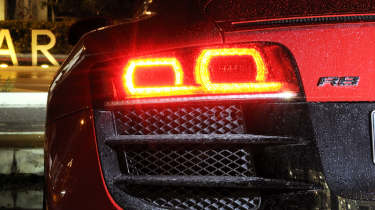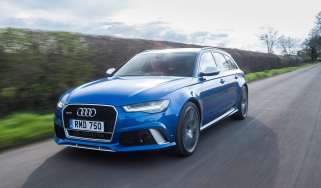Audi R8 v Lamborghini Gallardo LP560-4
Audi now offers its R8 with a 518bhp 5.2-litre V10 engine, but does it turn this desirable coupe into a true supercar?
There’s a feeling that the new V10-engined R8 is one for the doubters. An R8 for those who still aren’t convinced that Audi can build a truly great junior-league supercar, despite the praise heaped on the original V8 R8 and despite a display cabinet at Ingolstadt crammed with Le Mans winners’ trophies.
Me? I don’t need convincing, but I can see where the doubters are coming from. I can appreciate that for some the original R8 isn’t gritty and supercar-y enough, and that despite those 24-hour wins it still somehow lacks the hard-won, ingrained credibility of, say, a Porsche. It takes mere moments behind the wheel of an R8 to realise that it is in fact a very, very good car, and only a little longer to appreciate that dynamically it’s quite exceptional (a process that can be hastened considerably by a visit to a race track). Yet even faced with the depth of its dynamic prowess, you can still recognise that, for some, there remains a missing something. It’s a number of little things which when gathered and pressed together form a word: passion.
Everything about the R8 is more than acceptable; the exterior styling, the cockpit ambience, the performance, the noise, the handling and the ride. There’s finely detailed tactility too. What there isn’t enough of is the raw, bold, uninhibited passion that makes a car irresistible, gives it character. The R8 is all the sensibilities and values of Audi moulded into the shape of a mid-engined supercar. A brilliant car, but one more like the Honda NSX than an Italian exotic.
More reviews
Group tests
In-depth reviews
Reviews
- Audi R8 Spyder (2016 - 2024) review – that V10 in surround sound
- Audi R8 V10 RWD and R8 RWD Performance (2020 - 2024) review – Audi's 911 GT3 fighters
- Audi R8 V10 GT RWD (2022 - 2024) review – the R8 bows out in spectacular style
- Audi R8 4.2 FSI V8 quattro (2007 - 2015): review, history and specs of an icon
The new R8 V10 addresses this. Not visually, though the side-scoops are kicked out to grab more air and give more shape to the flanks, while the intakes and vents front and rear have gappier spars and there are new crinkly 19in alloys. Not in the cockpit either, though the (optional) carbonfibre trim that loops up from low on the door casing, around the back of the instrument pod and back down to the centre console sets off the impeccably tailored leather wonderfully.
No, predictably it’s the 518bhp, 5.2-litre V10 engine that moves the R8 up the credibility rankings, taking its performance into pukka supercar territory. Audi says it propels the R8 to 60mph in under 4sec, to 124mph in 12sec and on to a whisker short of 200mph. Like the 414bhp FSI V8, this direct-injection V10 is a long-stroke design and combines thumping low-down torque (80 per cent of the 391lb ft peak almost from tickover) with a potent, furious top-end that reaches as far as 8700rpm. Of course, it also adds a more intriguing, exotic soundtrack, erupting into life with a lightly silenced, nasally whoop.
There’s more. To go with the more muscular engine there’s a sharper, more dialled-in chassis, and its presence is apparent almost from the moment the wheels get turning. Steering weight is increased, but this is no simple tweak of the power assistance because beneath it there’s an appealing sense that the nose is better stuck to the asphalt. It’s reminiscent of the front-end feel of another mid-engined, four-wheel-drive, V10 supercar, but we’ll come to that soon enough.
There’s a keener edge to the ride too, which altogether gives the V10 a different, sportier vibe. The V8’s more supple damping and lighter, more delicate steering position it as a mid-engined GT while the V10 is more, well, GT3 (see box-out, p112). Stephan Reil, head of development at quattro GmbH, explains that the set-up of the V10 is stiffer overall, with uprated springs and dampers, a thicker rear anti-roll bar and a rear limited-slip differential with a higher locking rating to cope with the increased torque. Altogether they make the V10 crisper handling, with a little understeer built in at the limit ‘to give a warning of where you are,’ as Reil puts it.
The weather of Spain’s Costa del Sol isn’t being kind to us. Up in the hills back from the coast it’s cold, with layers of rain and mist. Even so, the 5.2-litre R8 is a satisfying place to be. There’s a very fine finish to its Nappa leather-lined interior and the dynamics feel every bit as smooth and finely finished. Over broken and ruckled asphalt back in Marbella it felt firmly suspended but took the sting out of the sharpest surfaces, and now we’re loping along the meandering, smooth-surfaced ‘Ronda Road’ it feels wonderfully direct and poised. Until you give in to the urge to fully exploit one of the rare straights and get the throttle to the stop…
Instantaneously the V10 delivers a massive kick, and the shove is relentless and consistent, right up to the point where the wharp-ing note of the V10 starts to sound a little crazy, as if it’s being speeded up. That’s around peak torque at 6500rpm, which, on this rain-slicked surface, is when the fat rear Pirellis can contain the engine’s urge no longer – both spin up and the back end jinks a degrees or two sideways before ASR steps in.
Yes, it’s a car with more of an edge to it, and as Reil had promised, when the front end comes slightly unstuck as you turn in, communicated by weight dropping from the steering wheel, that’s a warning shot across your bows. Flex your right leg a bit too keenly now and the rear will get loose quickly, before being arrested just as quickly by the well-judged stability control. In the dry I expect it’s as easy to over-drive as the V8, despite carrying an extra 31kg of engine, because it feels equally well balanced and even better hooked up at the front.
Standard kit on the V10 is more generous than on the V8 and includes Audi’s ‘magnetic ride’ dampers, offering Comfort and Sport settings. It’s when I go for the button to compare the two that I discover we have regular fixed-rate dampers – a no-cost option. This pretty much matches the Sport setting on the magnetic set-up and, says my colleague John Simister, who’s tried both, you’d only miss the comfort setting occasionally. I certainly haven’t.
There’s no question that the V10 offers a lot more low-rev urge than the V8, and it delivers in a more linear fashion too, the final lunge for peak power at 8000rpm a smooth, insistent ramping up from peak torque. Let it zing to the 8700rpm limiter just for the thrill of it and the noise is extraordinary. And yet like many other V10s, it’s a rather monotone, glum-sounding engine when it’s not hard at work, its note all soft-edged bass unrelieved by spangly middle or treble. Hooked up to the optional R-tronic automated manual gearbox in auto mode, on a steady throttle it can induce melancholy by playing a descending scale as it shuffles into the highest feasible gear as quickly as it can.
The regular manual shares identical ratios and is a delight to use, the lever sliding between the fingers of the open gate with a pleasingly direct, metallic action. Yet R-tronic, in maximum-attack Sport mode, sets that headline 12sec time to 124mph (the pure manual trailing on 12.3), though that’s not why we’ve chosen it.
When it arrives in the UK this summer the R8 V10 will cost £99,575, same as a 911 Turbo, give or take a pair of floor mats. Yet in many ways the more interesting comparison is with the Audi’s cousin, the Lamborghini Gallardo LP560‑4. The similarities go right to the core: they both have an aluminium chassis and body and the same V10 engine and automated manual gearbox. The only differences between their engines are the intakes and exhaust systems and mapping – the Audi could have the same 552bhp – while their gearboxes differ only in software calibration. Is Audi undermining its extrovert Italian arm? Is the R8 V10 a Gallardo on the cheap?
Certainly the V10 R8 is a more serious proposition than the V8, an R8 with the performance to lobby strongly for supercar status, but you only have to park it alongside the Gallardo to realise that doing the numbers is not nearly enough. Your eye flits from the sharp-edged drama and boldness of the Lambo to the soft-edged Audi and, despite its similar proportions and its scoops and grilles in roughly the same places, the R8 is put utterly in the shade.
In truth, the Gallardo’s cockpit is a bit ordinary, a slight anti-climax, though the exterior shape dictates a high waistline that, combined with the fat screen pillars, gives a distinctive pillbox-like feel. Good if you reckon a supercar should be a little intimidating, but the R8 offers great all-round visibility for a low-slung, mid-engined car.
Fire up the Lambo and you might think it’s powered by a whole other V10. It catches with a thunderous outburst loaded with a fluty, off-beat yowl, and if there are valves in its exhaust system they appear to be jammed open. It’s hungry, edgy sounding at all times, and it behaves how it sounds. The R8 has superb throttle response but the Gallardo snaps forward like it’s been given an electric shock, and the force that drives you into your seat is stronger too. Do the maths and together the extra 34bhp and 120kg off the kerb weight are surprisingly effective, massaging the power-to-weight ratio up from the R8’s admirable 325bhp per ton to a more striking 374.
Shift refinement has never been the Gallardo’s greatest strength and the R8’s shows up the rough edges. Also, the stumpy gearlever of the Audi may have + and – placed counter-intuitively but it’s much more natural to drop a hand to the centre console to select reverse than to hunt the facia for a button marked with a big ‘R’, as you do in the Lambo. Another area where the Audi scores easy points is in brake feel. This car has the optional carbon-ceramic discs (£6995) and they may be a little sharp-acting, but unlike the Gallardo’s at least they react for those confidence-inspiring brushes of the pedal to trim corner-entry speed.
Perhaps the biggest surprise, however, is the way these two cars feel on the road. The chassis of the V10 R8 is much firmer and more direct than the original V8, yet in comparison with the Gallardo on these soaking roads it has suppleness and feel to spare. The LP560 seems stiffer and reports every knobble and pimple in the surface while at the same time feeling less well connected to it. Sure, it covers the ground quickly, but it’s keener to push wide and to spin-up its rear wheels and the Audi maintains the same pace with relative ease. Of course, for a definitive verdict what we need to do is schedule a more thorough comparison on dry roads and maybe throw in a track and an epic drive too…
Despite its obvious shortcomings and price, the Lamborghini is the much more desirable car, the true supercar, the embodiment of passion. The R8 V10 takes Audi closer to Lamborghini territory but there’s no threat; the two sit together in Audi’s portfolio like olive oil and balsamic vinegar.
Make no mistake, the R8 V10 is an excellent car that’s certain to give the 911 Turbo a very hard time and which will draw interest from those considering an Aston DB9 or Mercedes SL63 AMG. And yet, the car the V10 really has to beat is the original V8-engined R8.
Price-wise, it’s a big step – from £77K to £99K. There is, Audi says, over £10K’s worth of kit on the V10 that’s optional on the V8, including satnav, premium hi-fi and magnetic ride damping. Fair enough, but I wonder whether the V10 makes the R8 a significantly more desirable car. Sure, it’s a keener-edged drivers’ car, the engine delivers the goods alright, and in supercar terms it has cylinder count on its side, but I’m not much taken with the noise it makes. Also, I reckon the V8 has more character to its delivery; it’s always thrilling when it gets its second wind at 6000rpm and lunges for the 8000rpm red line. Trouble is, I suspect that once you’ve tasted an R8 with over 500bhp, there’s no going back. . .
Extra Info
The racing R8The launch of the R8 V10 coincides with Audi’s first foray into the production car-based GT3 racing class with this, the R8 LMS. Handy, then, that the V10 engine is dry sumped as standard, guaranteeing oil supply at 1.2g lateral as well as lowering the 90-degree V engine in the chassis.
Interestingly, the bodywork of the LMS cars is carbonfibre and they are rear-drive rather than four-wheel drive. Even with a roll cage and safety equipment the kerb weight is expected to be around 1250kg, substantially less than the road car, while with GT3 air restrictors the V10 will produce around 500bhp. The transmission will be a six-speed sequential and brake discs will be carbon ceramic.
This year Audi will rent R8 LMSs to a couple of privateer teams before moving on to sales in August for the 2010 season.
Comparison
| Audi R8 | LP560-4 | |
| Engine | V10 | V10 |
| Location | Mid, longitudinal | Mid, longitudinal |
| Displacement | 5204cc | 5204cc |
| Bore x stroke | 84.5 x 92.8mm | 84.5 x 92.8mm |
| Cylinder block | Aluminium alloy, dry sumped | Aluminium alloy, dry sumped |
| Cylinder head | Aluminium alloy, dohc per bank, four valves per cylinder, variable valve timing | Aluminium alloy, dohc per bank, four valves per cylinder, variable valve timing |
| Fuel and ignition | Electronic engine management,direct injection | Electronic engine management, direct injection |
| Max power | 518bhp @ 8000rpm | 552bhp @ 8000rpm |
| Max torque | 391lb ft @ 6500rpm | 398lb ft @ 6500rpm |
| Transmission | Six-speed manual gearbox (automated sequential manual optional), four-wheel drive, limited-slip differential, ESP | Six-speed manual gearbox (automated sequential manual optional), four-wheel drive, limited-slip differential, ESP |
| Front suspension | Double wishbones, coil springs, gas dampers, anti-roll bar | Double wishbones, coil springs, gas dampers, anti-roll bar |
| Rear suspension | Double wishbones, coil springs, gas dampers, anti-roll bar | Double wishbones, coil springs, gas dampers, anti-roll bar |
| Brakes | Vented and cross-drilled discs, 380mm fr, 356 rear, ABS, EBD | Vented discs, 365mm front, 356mm rear, ABS, EBD |
| Wheels | 8.5 x 19in front, 11 x 19in rear, aluminium alloy | 8.5 x 19in front, 11 x 19in rear, aluminium alloy |
| Tyres | 235/35 ZR19 front, 295/30, ZR19 rear, Pirelli P Zero | 235/35 ZR19 front, 295/30 ZR19 rear, Pirelli P Zero |
| Weight (kerb) | 1620kg | 1500kg |
| Power-to-weight | 325bhp/ton | 374bhp/ton |
| 0-62mph | 3.9sec (claimed) | 3.7sec (claimed) |
| Max speed | 196mph (claimed) | 202mph (claimed) |
| Basic price | £99,575 | £147,330 |
| evo rating | 5/5 | 5/5 |




